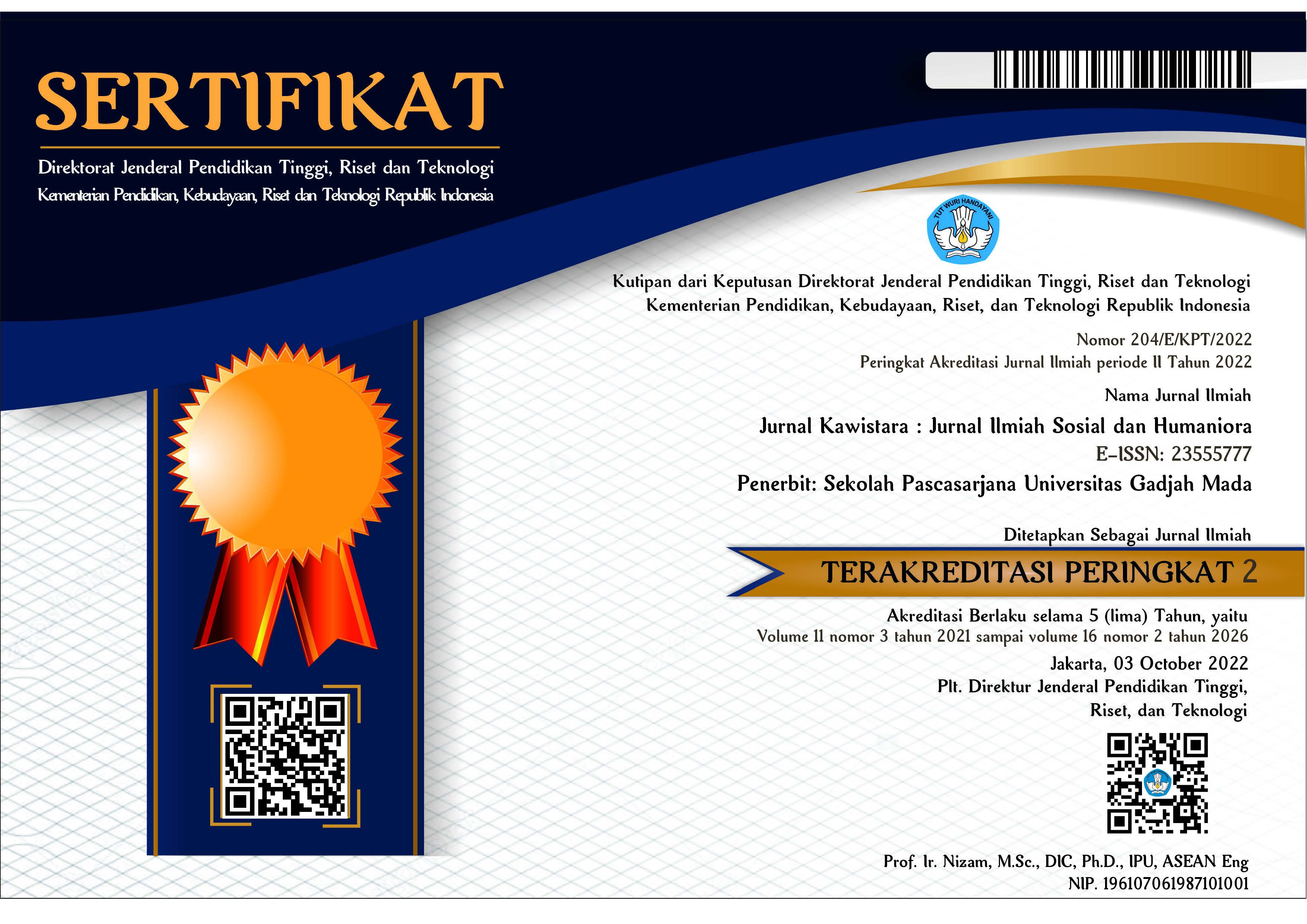DE-KULTURALISASI ISLAM DAN KONFLIK SOSIAL DALAM DAKWAH WAHABI DI INDONESIA
Saipul Hamdi(1*)
(1)
(*) Corresponding Author
Abstract
This article investigates the phenomena of a transnational Wahhabi movement particularly the Wahhabi local organization in Indonesia. Wahhabism is a puritan, textual, and reformist Islamic movement established in Nejd Saudi Arabia 18th century identified as part of the conservative Sunni orthodox tradition. It was determined as the major religious-state reference for shariah law formulation by the Saudi government and expanded to non-Arab countries around the world imposing reformation idea of Islamic religious tradition and academic culture. This article examines the expansion and growth of the Wahhabi local organization in Indonesia and the effort to perform deculturalization of Islam from the local religious tradition practices. Deculturalizing Islam or pulling out Islam from cultural mixture and absorption is not easy because Islam has integrated to the local religious tradition since its presence in the community around the 12th century, which shows a long negotiation and unification of those identities. In doing so, this article explores the response on Wahhabi deculturalization discourse and how the local people negotiate to this new identity and socio-religious transformation influenced by the Wahhabi’s teaching and ideology. The hypothesis of Wahhabi’s teaching position and role in shaping radicalism and terrorism has carried this research to understand the local context of Wahhabi in Indonesia, how the Wahhabi people understand and engage to radicalism and terrorism, the response to global jihadism propagation including Al-Qaeda and ISIS, and the production of Khilafah Islamiyah idea and mission. The aggressive approach of Wahhabi, which attacks a belief system of local Muslim practices and invigorates the new single identity of Islam, leads this article to investigate the patterns of Wahhabi socio-religious conflict in the communities and the influence to social disintegration existence.
Keywords
Full Text:
PDFReferences
Abdullah, Asaman. 2018. Radikalisasi Gerakan Jamaah Ansharut Tauhid dan Pengaruh ISIS Di Indonesia. Sosiologi Reflektif, 12(2):213-232
Algar, Hamid. 2002. Wahhabism: A Critical Essay, New York: IPI
Al-Rasheed, Madawi. 2007. Contesting the Saudi State: Islamic Voices from a New Generation. Cambridge : Cambridge University
Bonacina, Giovanni. 2015. The Wahhabis Seen through European Eyes (1772–1830): Deists and Puritans of Islam. Leiden: Brill
Bowen, Wayne H. 2008. The History of Saudi Arabia. London: Greenwood Press.
Chozin, Muhammad Ali. 2013. Strategi Dakwah Salafi di Indonesia. Journal Dakwah, 16(1):1-25.
Commins, David. 2009. The Wahhabi Mission and Saudi Arabia. London dan New York: I.B. Tauris.
Delong-Bas, Natana J. 2007. Wahhabi Islam: From Revival and Reform to Global Jihad. London: I.B. Tauris.
Feifer, Gregory ,2009. The Great Gamble: The Soviet War in Afghanistan. E-book: Harper Collins
Hamdi, Saipul 2015. Demazhabization of Islam, Divinity Economy and Narrative of Conflict on the Tablighi Followers in Samarinda East Kalimantan, Al Albab Bourneo Journal of Religious Studies, 4(2):146-168.
Hamdi, Saipul, Smith, Bianca J, dan Carnegie, Paul J. 2015. The Recovery of a Non-Violent Identity for an Islamist Pesantren in an Age of Terror,’ Australian Journal of International Affair, 69(6):1-19.
Hamid, Ahmad Fauzi Abdul. 2016. ISIS in Southeast Asia: Internalized Wahhabism is a Major Factor, Perspective, 24(1):1-11.
Hasan, Noorhaidi. 2007. The Salafi Movement in Indonesia: Transnational Dynamics and Local Development, Comparative Studies of South Asia, Africa and the Middle East, 27(1):83-94.
Hefner, Robert W. 2011. “Where have all the abangan gone? Religionization and the decline of non-standard Islam in contemporary Indonesia”, dalam Picard, Michel dan Madinier, Rémy, The Politics of Religion in Indonesia Syncretism, Orthodox, and Religious Contention in Java And Bali. London dan New York: Routledge.
Iddrissu, Abdulai. 2009. Contesting Islam: Homegrown Wahhabisme, Education and Muslim Identity in Northern Ghana 1920-2005. Disertasi di Department of History, University of Illinois At Urbana Campaign.
Jones, Seth G. 2014. A Persistent Threat the Evolution of Al-Qa’ida and other Salafi Jihadist. Washinton: Rand Corporation.
Lauziere, Henri. 2010. The Construction of Salafiyya: Reconsidering Salafism from The Perspective of Conceptual History. International Journal of Middle East Studi, 42(3):369-389.
Moore, Cerwyn Dan Tumetly Paul. 2009. Assesing Unholy Alliances in Chechnya from Communism and Nationalism to Islamism and Salafism, Journal of Communist Studies and Transnational Politics. 25(1):74-94.
Moniquet, Claude. 2013. The Involvement of Salafism/Wahhabism in the Support and Supply of Arms to Rebel Groups Around the World. A report by Ceo, European Strategic Intelligence And Security Center (Esisc), Belgium.
Picard, Michel dan Madinier, Rémy. 2011. The Politics of Religion in Indonesia Syncretism, Orthodox, and Religious Contention in Java and Bali. London dan New York: Routledge.
Rogers, Paul. 2004. A war on Terror: Afghanistan and After. London: Pluto Press.
Romero, Antonio J. 2007. The Different Faces of Islamic Terrorism. Journal of International Review of Sociology, 17(3):444-458.
Rubaidi, A. 2008. Radikalisme, Nahdlatul Ulama & Masa depan Moderatisme di Indonesia. Bandung: Logung Pustaka.
Rubin, Barry M. 2010. Guide to Islamist Movements. New York: M.E Sharpe
Stice, Ralph W. 2005. The Convergence of Current Events, Biblical Prophecy and the Vision of Islam: From 9/11 to 666. Nasvhille: Acw Press.
Taskarina, Leebarty. 2018. Perempuan dan Terorisme: Kisah Perempuan dalam Kejahatan Terorisme. Jakarta: Gramedia.
Valentine, Simon Ross. 2015. Force and Fanaticism: Wahhabism in Saudi Arabia and Beyond. London: Oxford University Press.
Sumber Wawancara:
Ahmad. (2018, September). Wawancara Personal
Budiman. (2018, 04 Maret). Wawancara Personal
Dian. (2018, Februari). Wawancara Personal
Fahirah, Irsyan, dan Jauhari. (2018, Februari). Wawancara Personal
Hidayat. (2018, Agustus). Wawancara Personal
Minda. (2018 Mei). Wawancara Personal
Mizan. (2018, Juli). Wawancara Personal
Rahmat. (2018, Maret). Wawancara Personal
Rahmini. (2018, Agustus). Wawancara Personal
Rahman. (2018, Agustus). Wawancara Personal
Rafi’i. (2018, Mei). Wawancara Personal
Saifuddin. (2018, April). Wawancara Personal
Article Metrics
Refbacks
- There are currently no refbacks.
Copyright (c) 2019 Saipul Hamdi

This work is licensed under a Creative Commons Attribution-ShareAlike 4.0 International License.
Jurnal Kawistara is published by the Graduate School, Universitas Gadjah Mada.







